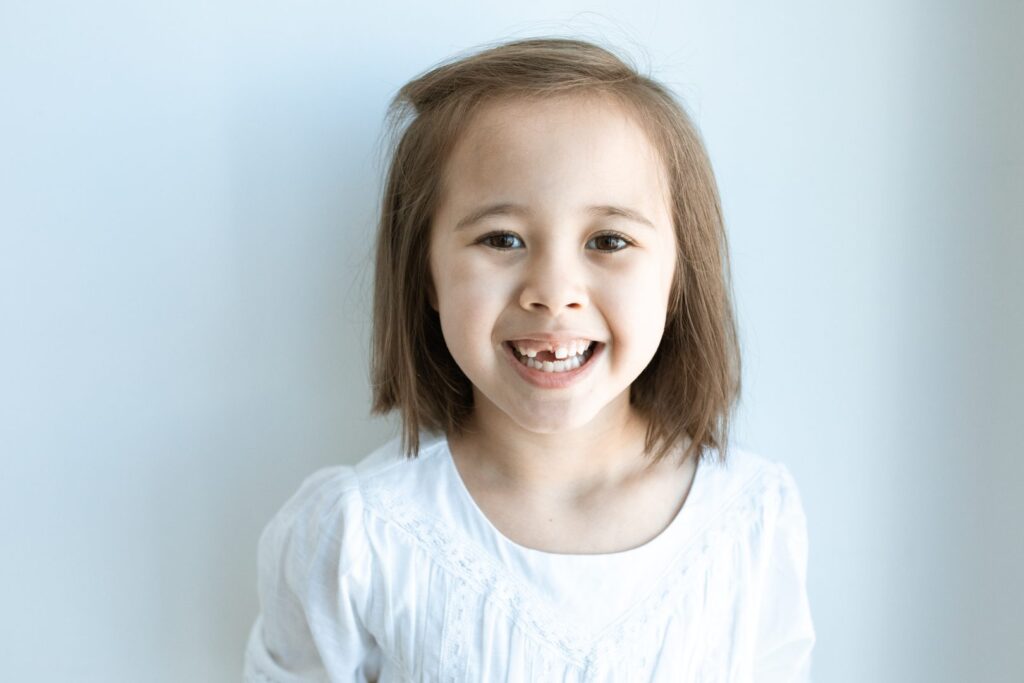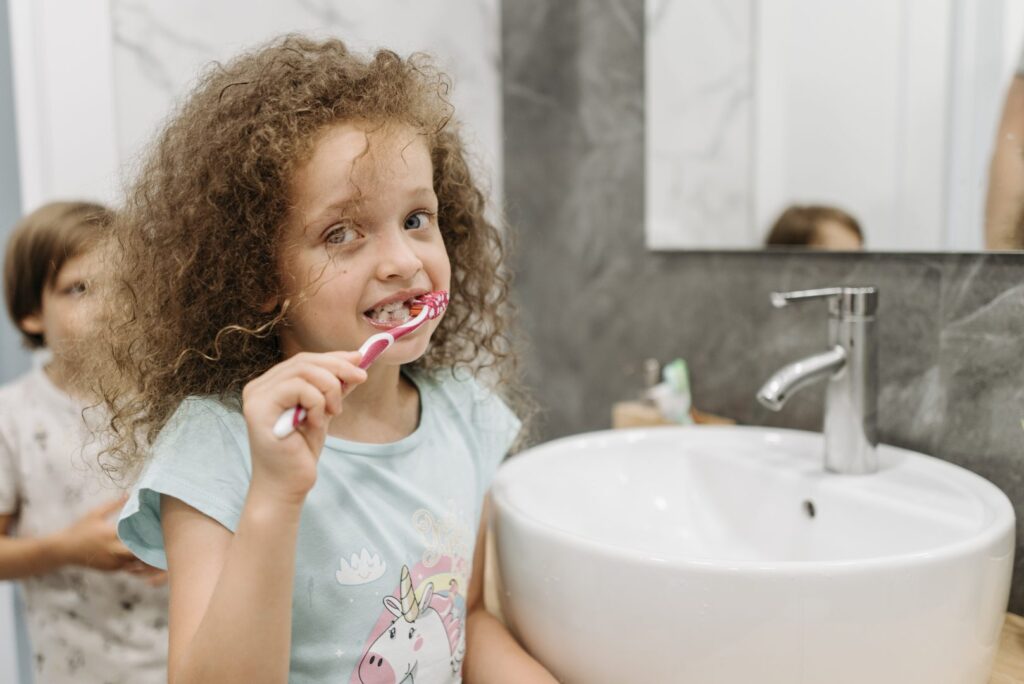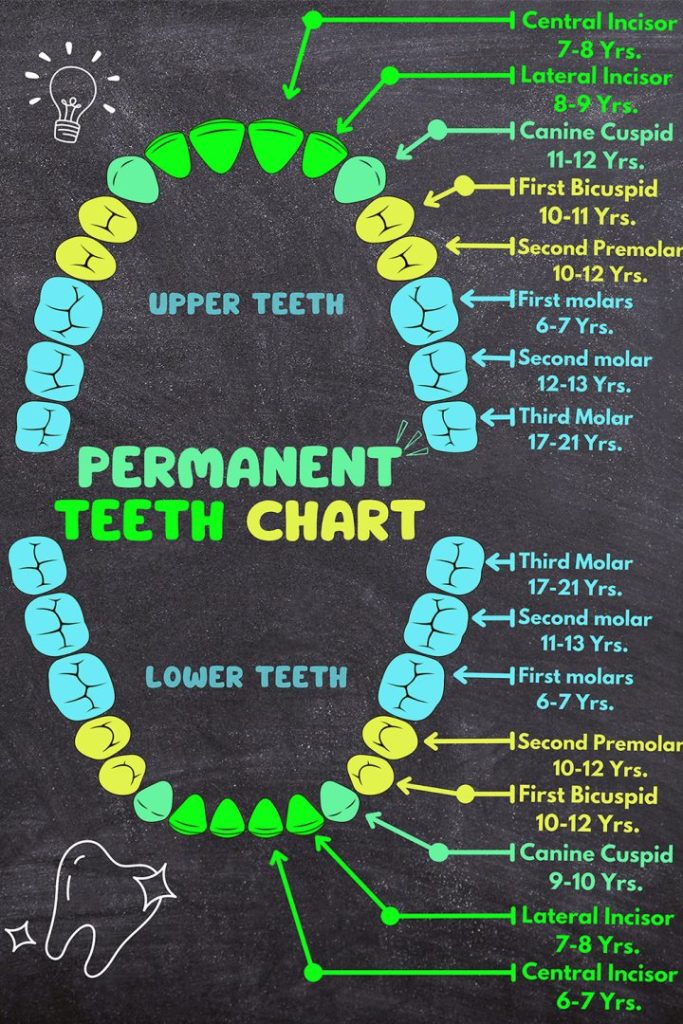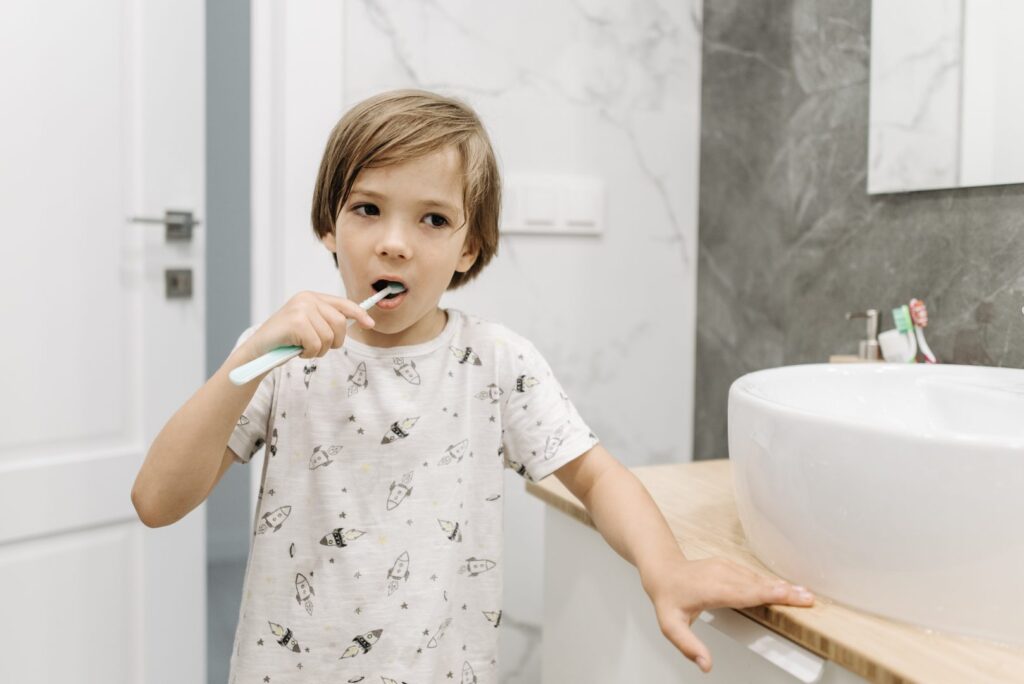Well, permanent teeth come in a different order than the baby teeth. Why is the human body so complicated?
Nonetheless, in this article, we’ll teach you about permanent teeth and when to expect them to come in for your kids.
We’ll also discuss the importance of permanent teeth and how to keep them clean, shiny, and healthy.
So, without further ado, we can venture into the waters of dental medicine and talk all about permanent teeth in children.
Definition and Types of Permanent Teeth
The set of teeth your children get after losing their baby teeth are permanent teeth (permanent meaning not eligible for putting under your pillow for the Tooth Fairy).

But not all permanent teeth are the same. They have different shapes and functions in your mouth. So, the permanent teeth include:
- Upper and lower central incisors;
- Upper and lower lateral incisors;
- Upper and lower canine cuspids;
- Upper and lower first cuspids;
- Upper and lower second premolars;
- Upper and lower first molars;
- Upper and lower second molars;
- Upper and lower third molars;
Importance of Permanent Teeth
After your child loses a baby tooth, a permanent one emerges. Well, those permanent teeth are meant to stay there for a lifetime.
A healthy human mouth should contain 32 teeth. Our 32 pearly whites help us eat and chew our food, making it easier to digest.
Another plus is that permanent teeth are stronger than baby teeth. Sounds great, right? Well, there’s always a catch.
Permanent teeth can develop tooth decay. And you can’t just wait for them to fall out because they won’t.
So, if you don’t teach your children how to take care of their permanent teeth, visits to the dentist can become regular.

Another bad thing (for your children, of course) is that the Tooth Fairy will stop coming. But why didn’t they think of a Brushing-your-teeth Fairy?
When do Permanent Teeth Come in?
According to experts, children usually get rid of their baby teeth between the ages of six and twelve.
That leaves a lot of space and time for permanent teeth to come in. So, your child might start growing their permanent teeth as early as 7 years old.
· How Long for Front Teeth to Grow in?
The front teeth (central and lateral incisors) are one of the most important since they help us bite off pieces of food.
The upper and lower central incisors should grow at the age of 7-8, while the lateral incisors between 8-9 years of age.
That means these teeth should grow in after just a few months of the baby teeth falling out. So your child won’t have to be embarrassed about walking with no front teeth for a long time.
· How Long Does it Take for Permanent Canine Teeth to Come in?
One of the most unique teeth is the canine teeth. They help your children chew their food more easily because of their specific form.
According to experts, the canine teens should fall out between the ages of 9-12. But they get replaced by permanent canine teeth in a few months.
To make things clearer, we’ll present our tooth eruption chart, which will prepare you, as a parent, for your child’s permanent teeth eruption.
Permanent Tooth Eruption Chart

Did you know that although the front teeth fall out first, the first permanent teeth that come in are the first molars (6-7 years of age)?
But you might’ve not noticed this since the first molars come in behind your child’s baby teeth. Pretty sneaky, right?
The permanent central incisors should erupt when your child is around 7-8 years old or just a few months after losing the baby central incisors.
Next, we have the upper and lower lateral incisors. They should come in when your child is around 8-9 years old.
Now come the canine cuspids. These uniquely shaped teeth should start shining at around 11-12 years of age.
Furthermore, come the first bicuspids. These permanent teeth should erupt when your child is about 10-11 years of age.
The first bicuspids are followed up by the second premolars, which should erupt around the age of 10-12.
Following are the second molars, which should appear around 12-13 years. At this age, your child shouldn’t be scared of the dentist anymore!
Lastly, come the third molars. The infamous wisdom teeth! These teeth erupt between 17-21 years. But they can also erupt many years later!
Taking Proper Care of Permanent Teeth
The biggest challenge children and parents after the permanent teeth come out is taking care of them. That includes:
- Brushing teeth twice a day;
- Visiting the dentist regularly;
One of the best habits you can teach your children is brushing their teeth at least two times in the day (in the morning and at night)
According to the American Dental Association, every teeth-brushing session should last at least two to three minutes.
That’s why it’s best to make that a habit for your little ones, even when their permanent teeth still haven’t arrived.
If you don’t want cavities to declare war on your children’s pearly whites, regular dental appointments should be a must.

It is advised to take your child to the dentist at least twice a year for regular control. But what if your child is scared?
Eliminate the chances of your child developing a fear of the dentist by taking it to a dental office as early as three months old!
Conclusion
We talked about the importance of permanent teeth in children, the types of permanent teeth, when they erupt, and how to take care of them.
Needless to say, we just merely covered the dental information that you, as parents, want to know, and discussed the habits your children should develop.
But the process of permanent teeth eruption isn’t just a formality. It’s a crucial developmental stage for both parents and children.
In that period, you should realize that your children are growing up, picking up more responsibilities, and learning new things.
But no one can take your place as a parent, so it’s essential to always be by your children’s side, no matter if they have baby or permanent teeth.
ALSO READ: At What Age Can a Child Ride a Bike With Training Wheels







